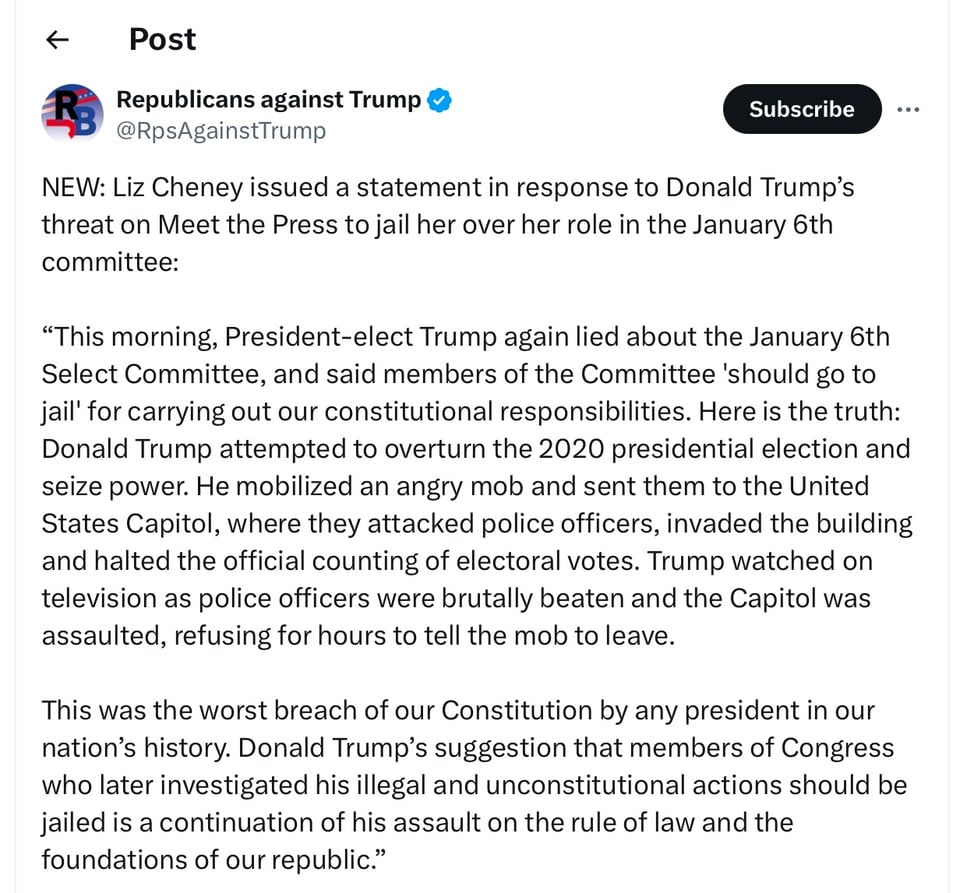Monday, December 9, 2024. Annette’s News Roundup.
Putin and Assad are losing in Syria.
Watch the President’s take on this unexpected state of affairs.👇
BREAKING: President Biden just rightly attributed the downfall of the horrific Assad regime to his historic work weakening Russia and Iran. President Biden’s foreign policy, supporting both Ukraine and Israel, has delivered tangible results.pic.twitter.com/ei9iprE4d6
— Democratic Wins Media (@DemocraticWins) December 8, 2024
Biden: For years the main backers of Assad have been Iran, Hezbollah and Russia. But over the last week their support collapsed, all three of them, because all three of them are far weaker today than they were than when I took office. pic.twitter.com/ga1peDtzX9
— Acyn (@Acyn) December 8, 2024
At long last, the Assad regime has fallen.
— President Biden (@POTUS) December 8, 2024
The fall of this regime is a fundamental act of justice.
It is a moment of historic opportunity for the long-suffering people of Syria to build a better future for their country.
It is also a moment of risk and uncertainty.
BREAKING: We are re-circulating this video of Tulsi Gabbard fawning over Bashar al-Assad for no particular reason. pic.twitter.com/IJ7KANYZMV
— Democratic Wins Media (@DemocraticWins) December 8, 2024
WATCH: Assad statue brought down as regime's 53-year grip on power comes to an end pic.twitter.com/uKUQAkJOp8
— BNO News (@BNONews) December 8, 2024
A Senior Admin official said Assad wouldn't have been toppled absent US support for Ukraine & Israel. His fall happened because his key reinforcements from Russia, Iran and Hezbollah, even Hamas, no longer had the capacity to help him.
The First Lady was in Paris for the re-opening of Notre Dame.
📸 @FLOTUS @DrBiden and her daughter Ashley, radiating grace and elegance, joined President Macron and First Lady Brigitte Macron at the iconic Notre-Dame Cathedral to honor its historic re-opening—a beautiful celebration of unity and shared heritage between the U.S. and France.… pic.twitter.com/AsUcJNu0m7
— Chris D. Jackson (@ChrisDJackson) December 7, 2024
Jill is all class. Ashley is the rest of us. Sigh... #NotreDameDeParis pic.twitter.com/AwsvKQapwX
— GeorgiaPeach Forever46 🇺🇲🦅🇺🇲 (@ChrisFromGA68) December 7, 2024
Side note. Apparently when Trump entered the Notre Dame Cathedral reopening with French President Macron, he was booed loudly by the those in attendance. BTW, he arrived accompanied by Elon Musk, no sign of J.D. Vance or Trump’s wife.
This was also true. 👇
This is how the President of Ukraine was welcomed in Paris — these ovations are for the entire Ukrainian people, who fight for their existence every single day.
— Maria Drutska 🇺🇦 (@maria_drutska) December 7, 2024
Thank you all for your support, friends. pic.twitter.com/QtbmR7Yb9Z
Then the First Lady was in DC for the Kennedy Center Honors.
SUNDAY IN DC 🇺🇲🦅🇺🇲
— GeorgiaPeach Forever46 🇺🇲🦅🇺🇲 (@ChrisFromGA68) December 8, 2024
4:30pm @POTUS hosts the #KennedyCenterHonors honorees. VP & SG attend
6:30pm POTUS & FLOTUS attend the Kennedy Center Honors. VP & SG also attend. pic.twitter.com/I5nDYGTNnR
The Vice President and Second Gentleman were there too.
.@VP Harris & @SecondGentleman at the Kennedy Center Honorees ceremony at the White House. ❤️
— best of kamala harris (@archivekamala) December 8, 2024
📸: Ron Sachs pic.twitter.com/0yr3jf8Nzu
Then honoring the men and women who died at Pearl Harbor.
Today, we honor the brave Americans who perished at Pearl Harbor 83 years ago, and the service members who defended democracy and freedom in the days and years that followed.
— President Biden (@POTUS) December 7, 2024
In their memory, let us carry forward their mission of forging a better future for humankind. pic.twitter.com/1daVTc4f2h
On National Pearl Harbor Remembrance Day, we remember the service members and civilians who paid the ultimate sacrifice for our country.
— Joe Biden (@JoeBiden) December 7, 2024
Let us carry forward their mission of forging a better future for humankind—one of greater dignity, opportunity, and security for all. pic.twitter.com/3uOQ4ornrt
Same ole same ole. BS.
Yesterday 👇 One sick man.
Trump uses a photo of himself with Jill Biden yesterday at Notre Dame to sell his new fragrance line. pic.twitter.com/8c8NUspStK
— Yashar Ali 🐘 (@yashar) December 8, 2024

Then there was an appearance by a pathetic, cruel and ignorant man on Meet the Press, an embarrassing appearance.
I have no comment. But he’s loathsome. https://t.co/pibMmq0Lx8
— Gen Michael Hayden (@GenMhayden) December 8, 2024
Trump: If I won that election, I won't get into it, because we don't need to start that argument. I think it's an easy argument, it was even proven more conclusively by the win that I had on this one.
— Acyn (@Acyn) December 8, 2024
Welker: But you did lose.
Trump: That's your opinion. pic.twitter.com/1I9903tIUt
Welker: Do you have an actual plan at this point for health care?
— Acyn (@Acyn) December 8, 2024
Trump: Yes. We have concepts of a plan that will be better.
Welker: Still just concepts? Do you have a fully developed plan? pic.twitter.com/bIgzXdaYe5
Liz Cheney and Adam Kinzinger respond to Trump’s threat on Meet the Press yesterday.

Adam Kinzinger on Trump telling NBC that the Jan. 6 members should go to jail: "The executive branch can't go after the legislative branch because we embarrassed him. That's not a sin." pic.twitter.com/6s4HUGlwFH
— Manu Raju (@mkraju) December 8, 2024
Don’t let him scare you. There are guard-rails.
A number of our friends won’t watch the news. They tell us they can’t sleep. On the rare moments they mention the Trump Presidency, they describe a future Armageddon based on Trump’s authoritarianism and threats.
To them, I say don’t empower him by anticipating and suffering from that which he may never be able to implement.
It’s a long road between now and Trump’s fantasy of an America which he controls completely.
Be strong. 💪 💪🏽💪🏻 🦾
No, Trump Can’t Just ‘Dismiss’ the Senate.
The threat from House Republicans should be seen and called out for what it is: an autocratic move that is not just unlawful but contemptuous of constitutionalism.
By Akhil Reed Amar, Josh Chafetz, and Thomas P. Schmidt

Donald Trump has not even returned to office, and already a constitutional crisis may be in the making. Trump has started announcing the people he intends to nominate for positions in his new administration. That is his prerogative. Several senators have criticized some of Trump’s choices. That is their prerogative (and two Trump nominees have already withdrawn under pressure). But rumors have been circulating of a plan to have Trump dismiss the Senate altogether, in a desperate effort to jam his nominees into office. There is simply no way to do this consistent with the text, history, and structure of the Constitution.
The Constitution and laws require the Senate’s approval to fill many of the government’s most important offices—such as attorney general or secretary of state—all of which wield extraordinary powers on behalf of the public. The Senate’s involvement helps to ensure that the people in these jobs have the necessary competence and integrity. In Alexander Hamilton’s apt words, the Senate can prevent the appointment of “unfit characters” who would be no more than “obsequious instruments” of the president’s “pleasure.”
The Senate’s check on the president can of course lead to friction and frustration at the start of an administration, while a new president’s nominees are considered and sometimes even rejected by the Senate. Advice and consent takes time. But as Justice Louis Brandeis famously observed, checks and balances exist “not to promote efficiency but to preclude the exercise of arbitrary power.” The purpose of the Constitution “is not to avoid friction” but “to save the people from autocracy.”
That is why any effort to cut the Senate out of the appointments process would be troubling; it is disdainful of self-government under a Constitution altogether. Trump’s supporters have suggested two ways to get around the Senate’s advice-and-consent process. In the first, the Senate would vote to go into recess soon after Trump’s inauguration, allowing him to unilaterally make a series of “recess” appointments. That plan may formally be legal, but it is plainly improper. The president is authorized to make recess appointments to “ensure the continued functioning of the Federal Government when the Senate is away,” as Justice Stephen Breyer wrote for the Supreme Court in 2014. That mechanism was vital in an age when the Senate was frequently absent from the capital for months at a time and could not quickly and easily reconvene. But, as Breyer also noted, the Constitution does not give “the President the authority routinely to avoid the need for Senate confirmation.” For the Senate to go into recess at the beginning of a new administration for the sole purpose of allowing the president to fill up the government with whomever he pleases—all while the Senate is controlled by the president’s party and perfectly capable of considering his nominees—would be a clear misuse of the recess-appointment power. Happily, the new Senate seems to agree, balking at Trump’s request that it surrender its prerogative so meekly.
As a result, some House Republicans have begun to discuss a more extreme scheme, one Trump considered during his first term: Trump could instead send the Senate home against its will and fill the government during the resulting “recess.” This is flagrantly unlawful.
How, one might ask, would such a plan even work? After all, the president, unlike an absolute monarch, does not have the power to dismiss Congress whenever he wants. Three of the first six “abuses and usurpations” charged in the Declaration of Independence related to King George III’s treatment of legislatures: He had “dissolved Representative Houses repeatedly,” he had refused to hold elections after these “dissolutions,” and he had “called together legislative bodies” at “distant” and “uncomfortable” places. The Framers were careful not to entrust the new office of president with such potent tools of “tyranny.” Instead, the president was given the power to “adjourn” the houses of Congress in only one narrow circumstance: “in Case of Disagreement between them, with Respect to the Time of Adjournment.” This power is so limited that it has never been used in all of American history.
The House Republicans’ idea seems to be to manufacture a “disagreement” to trigger this adjournment power. First, the House of Representatives would pass a resolution calling for a recess. The Senate would then (in all likelihood) refuse to pass the resolution. Trump would then declare the houses to be in “disagreement” and adjourn both houses for as long as he likes. From there, he would start his recess-appointments spree. There is just one glaring problem: The “disagreement” in this scenario is illusory.
Under the Constitution, each house can generally decide for itself how long it will sit. As Thomas Jefferson, an expert on legislative procedure, wrote in 1790: “Each house of Congress possesses [the] natural right of governing itself, and consequently of fixing it’s [sic] own times and places of meeting.”
The Constitution limits this autonomy in one key way: “Neither House, during the Session of Congress, shall, without the Consent of the other, adjourn for more than three days, nor to any other Place than that in which the two Houses shall be sitting.” In other words, if one house of Congress wants to leave in the middle of a session, it has to get the permission of the other house. The House of Representatives can’t just skip town if the Senate thinks important legislative business remains. But note that this provision limits each house’s power to “adjourn,” and not each house’s power to remain “sitting.” Neither house needs the agreement of the other to stay in session. If the Senate wants to let the House of Representatives leave while it considers appointments or treaties, that is perfectly fine. Indeed, there are plenty of examples of one house giving the other permission to go home. Under Article I, then, each house requires consent of the other to quit, but not to sit.
Hence the trouble for the House Republicans’ plan: If the House of Representatives wants to recess, the Senate can simply let it. And if the Senate agrees to let the House go, the House can leave and there is no relevant “disagreement” for the president to resolve by adjourning Congress. The Senate would still be in session as normal.
The president’s adjournment power is not a backdoor way for one house of Congress to force the other into recess against its will. If both the Senate and the House want to leave, but cannot agree on a “time of adjournment,” then the president can step in. In the words of a 19th-century treatise by Justice Joseph Story, an intervention from the president in that kind of situation is “the only peaceable way of terminating a controversy, which can lead to nothing but distraction in the public councils.” Perhaps if one house of Congress wants to leave, but the other house won’t let it—effectively holding it hostage in the capital—the president could also step in to resolve that disagreement by releasing the house that wants to leave. During the ratification debates in Virginia, James Monroe questioned whether it was proper “that the members of the lower house should be dependent on the senate,” given that they are prevented from “returning home” without the senate’s consent. James Madison responded by pointing to the president’s adjournment power.
What some House Republicans seem to be suggesting is worlds away from those scenarios—it is closer to the prorogation or dissolution power claimed by the British Crown and reviled by the Founders. Simply put, the House of Representatives cannot collude with the president to deprive the Senate of its constitutional power to advise and consent on appointments. That would make a mockery of the Constitution’s text and structure. If the House attempts this maneuver, the Senate should resist it by continuing to meet, and the courts should refuse to recognize any resulting appointments. The threat to adjourn the Senate should be seen and called out for what it is: an autocratic move that is not just unlawful but contemptuous of constitutionalism.
Akhil Reed Amar teaches constitutional law at Yale University and is the author of The Words That Made Us: America’s Constitutional Conversation, 1760–1840.
Josh Chafetz is a law professor at Georgetown and the author of Congress’s Constitution: Legislative Authority and the Separation of Powers.
Thomas P. Schmidt is a professor at Columbia Law School. He previously worked as an attorney in New York.
(The Atlantic).
These Times Demand Courage

We are already learning who will stand up to Trump and his reckless enablers and who will kowtow out of fear.
“These are the times that try men's souls,” Thomas Paine wrote in 1776 in Common Sense, his 47-page polemic confronting the unjust rule of a king. “The summer soldier and the sunshine patriot will, in this crisis, shrink from the service of his country.”
Paine’s proposition offers a useful frame for our own moment that is testing our souls, our principles and the seriousness of our commitment. Who will have the courage to stand up and assert their patriotic dedication to our democratic way of life? Who will shrink from this service and allow themselves to be overtaken by fear—fear of a man fueled by grievance, vengeance and bloodlust, fear of cruel and reckless sycophants determined to serve their master rather than justice, the rule of law and the Constitution?
We are quickly learning who is shrinking and who is rising, who is kowtowing to the wannabe king and who is lighting the way to our democratic future, who is looking ahead to Americans acting with optimism and confidence, not hopelessness and fear. We are learning this now, even while the transfer of power won’t happen for another 44 days.
In recent days, I have been encouraged by election lawyer Marc Elias and former advisor to VP Mike Pence Olivia Troye, both dedicated pro-democracy advocates who have shown in word and deed that they are not willing to submit to the threats. Their early acts of opposition are a source of nourishment for all of us who wonder how these coming months will play out.
Both have been targeted by Kash Patel, Trump’s henchman and preferred weapon to run the FBI. Patel has called Elias, who won in 64 out of 65 legal cases in which Trump sought to overturn the 2020 results, “an enemy of the Republican Party.” Rather than lay low, Elias—who publishes Democracy Docket—has asserted his convictions and commitment with clarity and confidence. It’s not that he is fearless, of course. As Mark Twain noted, “Courage is resistance to fear, mastery of fear, not absence of fear."
Here’s how Elias put it on MSNBC’s Deadline White House with Nicolle Wallace on Wednesday, referencing Patel’s attention:
Right now there are a lot of people who are quietly scared and there are a lot of people who are publicly scared. There are a lot of people engaging in anticipatory obedience…I’m proud of the fact that I stand up for democracy and that I win. And we need everyone to be a little bit courageous. It’s OK to be scared. It’s OK to be nervous. I’m nervous, I’m scared at some level. But you know, everyone needs to be a happy warrior in this fight. Everyone needs to have a little bit of courage in this fight.
For Elias, that includes increasing his own efforts to advocate for democracy. “The success of our democracy rests on an effective opposition movement,” he wrote yesterday. “We all must play a part in offering additional ideas and approaches and not being afraid to take risks.”
Also on Wednesday, Olivia Troye posted the letter sent by Patel’s attorney threatening a defamation lawsuit and demanding her to retract her statements about Patel’s lack of fitness to serve as FBI director. Several days earlier on MSNBC, she said, “Kash Patel is a delusional liar. Let me be very clear about that. And he would lie about intel, he would make things up about operations….I know this because at some point I realized I needed to double-check Kash’s work to make sure I wasn’t misinforming Mike Pence by relying on his word. So I had to go around him.”
Troye is not backing down. “This follows his threats against media & political opponents, showing how he might act if confirmed,” Troye posted on Bluesky. “I stand by my statements.” Responding to CNN anchor Jim Acosta about what Patel’s threats portend, Troye said, “I think it’s a very clear sign of what’s to come should he become the director of the FBI and how he’s going to conduct himself…By sending that letter to me, it was an attempt to bully me, silence me, intimidate me. But it’s also a signal to others.”
Yes, I’m keeping my eyes on those who stand up for principle, for democracy and decency, and who don’t act out of fear. Courage is not “the absence of fear,” Nelson Mandela said, “but the triumph over it.” And, as Marc Elias told me yesterday, “I don’t allow it [fear] to prevent me from standing up for what is right. Trump wants us to be paralyzed by worry. I refuse to give him that power over me.”
They stand in stark contrast to the weak-kneed among us who are already bowing down to Trump’s threats of retribution, even when they try to dress it up as something else. In recent days, that particularly includes media types like Mika Brzezinski and Joe Scarborough and the billionaire owner of the Los Angeles Times, Dr. Patrick Soon-Shiong.
You may have already heard that Atlantic writer David Frum was asked during a break to leave Morning Joe after making a joke about Pete Hegseth’s drinking and Fox News’ tolerance of this bad behavior. (“If you’re too drunk for Fox News,” Frum said, “you’re very, very drunk indeed.”) After he exited, Brzezinski apologized for their guest’s joke: “The comment was a little too flippant for this moment we’re in.” The clip has the squirmy feel of a hostage video. While Scarborough looks on without expression, Brzezinski seems to be speaking to “someone,” to make it clear that they won’t cross a line and please, please don’t retaliate.
In a follow-up article in The Atlantic, titled “The Sound of Fear on Air,” Frum described his “unsettling experience” when he was warned by a producer not to repeat any comments about Fox. He concluded his essay like this: “I do not write to scold anyone; I write because fear is infectious. Let it spread, and it will paralyze us all. The only antidote is courage. And that’s infectious, too.”
That’s the opposite of the lesson that Patrick Soon-Shiong, billionaire owner of the Los Angeles Times is delivering. After rejecting the paper’s planned endorsement of Kamala Harris just before the election, Soon-Shiong is now adding right-wing CNN commentator Scott Jennings to his editorial board, has introduced an artificial intelligence-powered meter to counteract signs of bias in the paper’s news coverage by delivering “both sides,” and reportedly is now reviewing the headlines of every opinion piece before it publishes.
As Oliver Darcy noted in his media newsletter Status on Tuesday, “Since Trump’s victory in November, Soon-Shiong has turned to X to criticize the news media, praise Trump’s cabinet picks, and appeal to a MAGA audience. The change in behavior has confounded his journalists, who wonder what happened to the Soon-Shiong whose newspaper enforced strict Covid restrictions and emphasized its support for social justice causes.”
Let’s give the last word to legal analyst Harry Litman, who has resigned as a weekly columnist for the Los Angeles Times. “I don’t want to continue to work for a paper that is appeasing Trump and facilitating his assault on democratic rule for craven reasons,” he wrote on his new Substack newsletter, adding, “Soon-Shiong has made several moves to force the paper, over the forceful objections of his staff, into a posture more sympathetic to Donald Trump...Given the existential stakes for our democracy that I believe Trump’s second term poses, and the evidence that Soon-Shiong is currying favor with the President-elect, they are repugnant and dangerous.”
These are times that try our souls. These are times that demand courage. (Steven Beschloss, AmericaAmerica).
See you tomorrow!